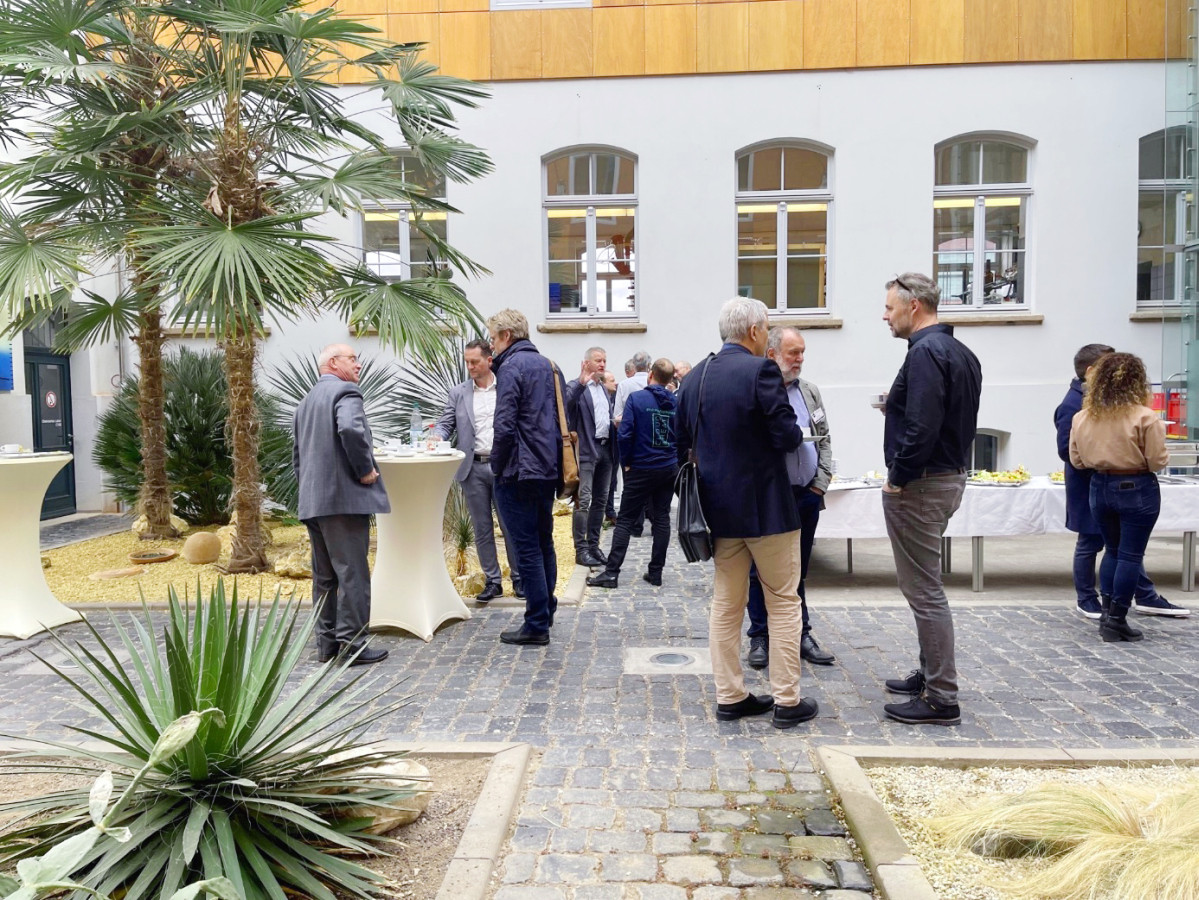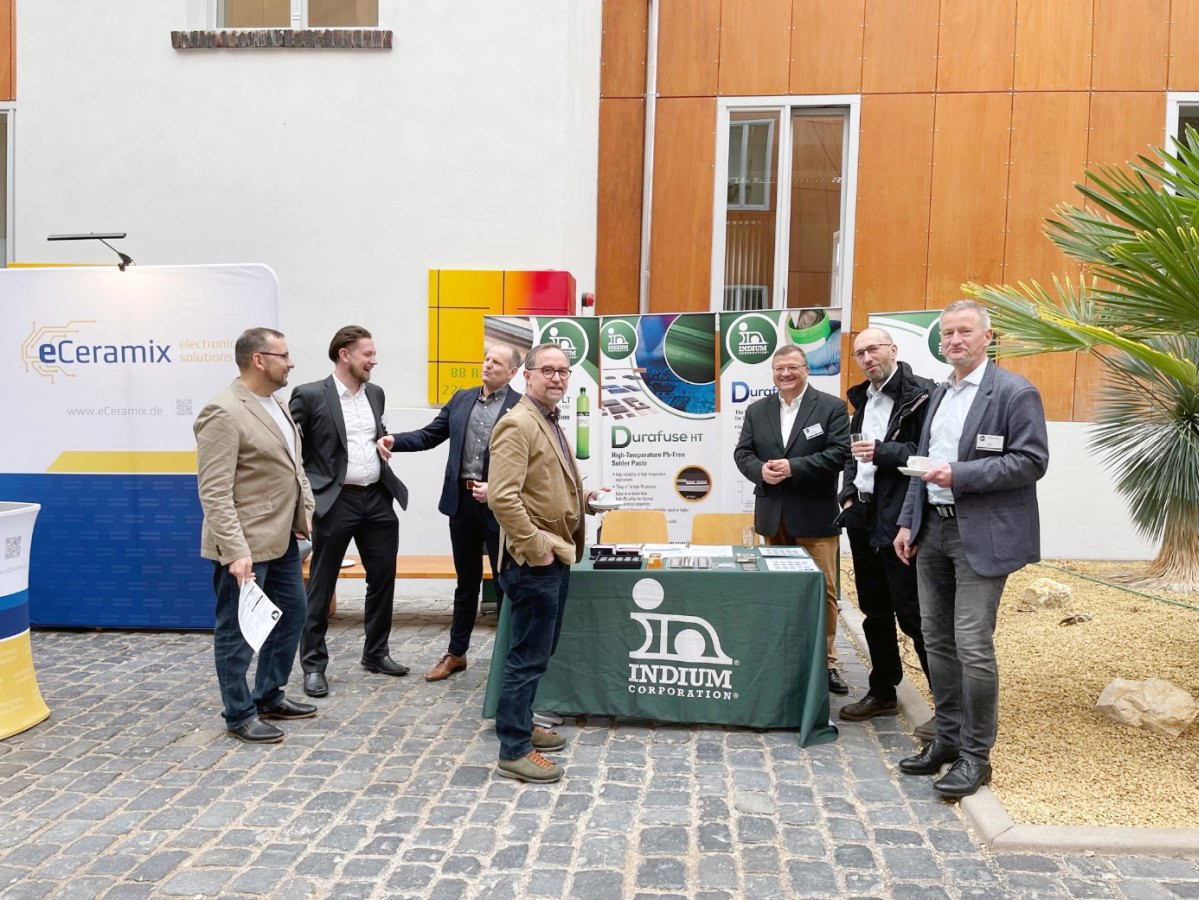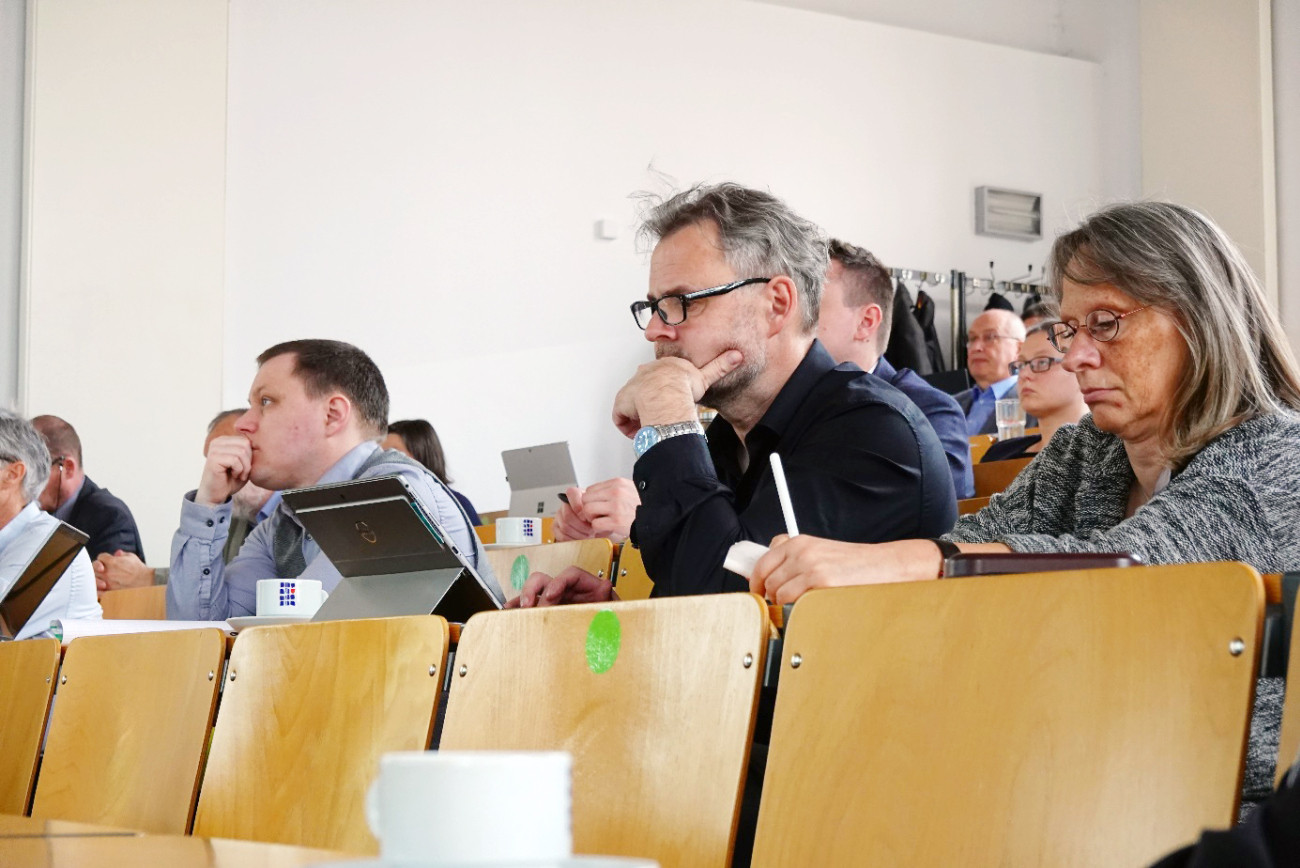Review of the IMAPS Spring Conference 2023 in Ilmenau
On March 23, 2023, the IMAPS Spring Conference took place on the premises of the Ilmenau University of Technology. With the theme of the conference "Is electronics really sustainable?", the organizers hit on an increasingly important point.
With almost 60 participants, 12 presentations and various exhibitors on site, the topic was discussed intensively.
The presentations were divided into 3 program blocks, so that there were opportunities to talk to the exhibitors during the extensive coffee breaks. This time, the exhibitors included UniTemp GmbH, Indium Corporation, Hilpert Electronics AG, Microtronic M. V. GmbH and eCeramix GmbH.
At the beginning of the event, Martin Schneider-Ramelow, 1st Chairman, opened the event and welcomed the visitors with great pleasure.
Jens Müller from TU Ilmenau also welcomed the audience and said a few words about the Technical University and the architecture of the buildings, some of which are very old but well preserved.
 Networking during the lunch break (Photos: Imaps)
Networking during the lunch break (Photos: Imaps)
In the first block of the program, Martin Ziegler from the TU Ilmenau gave his lecture on "Bio-Inspired Information Pathways", in which the disadvantages of artificial intelligence with regard to the futureCO2"footprint" were highlighted and possible ways out were presented. Together with his team, Ziegler is working on constructing a neuromorphic IT, i.e. an information exchange of sensors with feature extraction and a neural network of logic and memories.
The second presentation was given by Karsten Schischke from Fraunhofer IZM. The topic was "On the road to climate neutrality: where are the hotspots in the electronics industry's supply chain and what options are there for action?" He first reported on the "Legally compliant environmental management in the electronics industry" working group, the topics it deals with and the next meeting, including an invitation to join.
Under his slogan "Greener is always possible", he reported on the first rethink in the electronics industry with regard to the expected climate crisis. Some companies, especially large ones, are working hard to become climate-neutral as quickly as possible. The measures required to act quickly and sensibly during the crisis are only available to a very limited extent. A transparent data basis is virtually non-existent. It is also essential to consider the life cycles of electronics. In his view, theCO2 hot spot is initially in semiconductor production and then in PCB production. This is where measures to achieve the ambitious climate targets must be taken as a matter of priority.
Manuel Thesen from the Research Fab Microelectronics Germany then gave a presentation entitled "Competence center for resource-conscious information and communication technology - Green ICT @ FMD". After a brief introduction to the Fraunhofer Gesellschaft and its alliances, Manuel Thesen presented the Research Fab Microelectronics Germany (FMD). In the "Green ICT@FMD" project, a competence center for resource-conscious information and communication technology is being created, which aims to contribute to reducing theCO2 footprint of digital technologies through research and development.
The last lecture in the first section deals with "Sustainability in the field of electronics and semiconductor production using the example of CO2 reduction". Wolfgang Nüchter from Robert Bosch GmbH reported that the company has been climate-neutral worldwide since 2020.
After a coffee break, Andreas Karch from Indium Corporation gave his presentation entitled "Energy efficiency in reflow soldering with new composite solder materials".
 Discussions with the exhibitors during the breaks
Discussions with the exhibitors during the breaks
Following a brief company presentation, he used the example of a smartphone to explain the problem of theCO2 footprint and concluded that 1 kg ofCO2 could be saved every two hours if the reflow peak temperature could be reduced from 240 °C to 205 °C. However, it is also important that sustainable materials are used throughout the entire process chain. For this reason, Indium has been working on a DurafuseTM paste technology. A special paste mixture ensures that more tin goes into the liquid phase during reflow soldering to increase the joint melting temperature and eliminate the low melting peak that typically occurs with In/Sn solders. Subsequent quality studies look promising.
"Climate-neutral and yield-optimized printed circuit boards for prototypes and small series" was the topic of Patrick Franken from AISLER B. V. His concept for sustainability in electronics is to make better use of printed circuit board benefits. Until now, panels have been designed in such a way that only 60-80% of the surface area is used. AISLER has found a way to bring the utilization on a panel to more than 96%. This results in significantly less waste.
Heraeus Deutschland GmbH & Co KG explained the behavior of three different solder alloys with reduced silver content compared to the reference paste Innolot in the presentation "Combined approach to the development of solder alloys and fluxes for cost-efficient, highly reliable solder joints in automotive electronics". In addition, rosin resins, which are typically used in no-clean solder pastes, are compared with fully synthetic acrylic-based resins.
Marco Dörr from Solderpunks e. V. gave a presentation entitled "From ore to scrap - a look behind the scenes of the electronics industry". Videos showed what happens in scrap yards and how much electronic scrap is actually produced. Marco Dörr drew attention to how the various raw materials are extracted and the conditions under which mining is sometimes carried out. His approach is to first create awareness among the population so that something can fundamentally change. He reported on the first good approaches and mentioned the "Faitrade Gold", Rephone and Fairphone projects.
The subsequent lunch break was used for refreshments, networking and to get some fresh air. The speakers answered many questions from the visitors during the meal, as the need for discussion was greater than the time allotted for questions directly after the presentations.
Karsten Schischke from Fraunhofer IZM spontaneously stepped in for his colleague who had fallen ill and gave a presentation on "Circular economy in the electronics industry - the use of recycled plastics in new electrical and electronic devices". The approach of the lecture was: From linear thinking...to circular thinking. What has to happen in product development to make recycling possible, how can the materials used be recovered and how must products be designed so that they can be easily recycled? Various projects are presented in which plastics have been recycled. Properties such as color uniformity, mechanical properties and stability, odor, etc. have been successfully solved. One challenge so far has been contact with food, use for medical devices or toys.
Boudewijn Venema from duotec GmbH showed in his presentation "Clear vision for the energy transition - The potential of innovative quantum sensor technology for the digitalization of low-voltage distribution grids" how the development and the effects of the energy transition look like. He explained how energy distribution was planned in the 1970s and how the use of energy has changed today. With the help of NV centers in diamond (a topic from quantum sensor technology), it can be shown how the energy flow can be made visible and what this process can be used for.
Klaus Hofmann from TU Darmstadt presented the theory of purity analysis using ultrasound in his lecture "Ultrasonic sensor system for high-precision analysis of binary mixed gases". After presenting the various measurement methods, he presented his results and concluded the lecture with a comparison of his project with the state of the art.
The last lecture of the day, entitled "Sustainable HPC and AI data centers with waste heat utilization", was given by Jens Struckmeier from Cloud&Heat Technologies GmbH. In line with the company's vision, a concept was presented that uses only renewable energy to operate the company's servers. He presented various servers and their new cooling systems and at the same time showed how high the cost savings are.
Shortly before 4 p.m., Martin Schneider-Ramelow bid farewell to the participants and speakers and thanked them for their new approaches, great suggestions and ideas for making the electronics industry sustainable and, above all, for the lively discussions and questions from the audience.
 The auditoriumAlmost 45 conference participants as well as two honorary members attended the cozy dinner the evening before. We were delighted that the gentlemen were able to attend the meeting.
The auditoriumAlmost 45 conference participants as well as two honorary members attended the cozy dinner the evening before. We were delighted that the gentlemen were able to attend the meeting.
Many thanks to Jens Müller for organizing this successful conference at the TU Ilmenau!

View individual presentations
To view and download individual presentations, please follow the link https://imaps.de/event/imaps-fruehjahrsseminar/ and log in via 'Registration'. The individual PDF files are displayed in the list view under 'Event program'.
Call for Abstracts / German IMAPS Conference / October 19 - 20, 2023, Munich
Every autumn, IMAPS Germany organizes an annual conference on current topics in packaging technology in all fields of application. In order to secure, strengthen and further develop Germany as a business location, IMAPS Germany would like to see the annual conference as an important platform for the necessary close-meshed technical discussion between industry and academia as well as production and research. We therefore cordially invite you again this year to present your results on the following microelectronic packaging topics at our conference in front of representatives from industry and science and to discuss them together (presentation 20 minutes + discussion, set of slides for participants, no full paper required):
Please submit your abstract by July 1 (approx. 200 words) for consideration. Please note that all abstracts must be registered in our evaluation system via the link provided:
https://www.conftool.net/imaps-herbsttagung-2023/index.php
Design, Modeling, Simulation
- Electrical and electromagnetic design
- Thermal and thermomechanical design
- Design for manufacturing and testing
- HF design and 3D design
Materials and processes
- Substrate materials and surface layer systems
- Production of wiring carriers
- Connection technologies
(flip chip, CoB, SMT, embedding, ...) - Protection, potting and encapsulation processes and materials
- Nanomaterials
System integration technologies
- Wafer level packaging (CSP, SiP, ...)
- Substrate level packaging
(system on board, embedding, ...) - MEMS / sensor packaging
- Optoelectronic packaging
- 3D packaging
Quality and reliability
- Process monitoring / test strategies
- Test systems
- Thermomechanical reliability
- Reliability under combined stresses
- Lifetime monitoring and prediction
Once again a
BEST PRESENTATION AWARD
will be presented again!
Calendar of events
|
Venue |
Period |
Event name |
Organizer |
|
Oslo |
12 - 14 Jun 2023 |
NordPac 2023 |
IMAPS Nordic |
|
Cambridge |
11 - 14 Sep 2023 |
EMPC 2023 |
IMAPS UK |
|
San Diego |
Oct 02 - 05, 2023 |
56th International Symposium on Microelectronics |
IMAPS US |
|
Munich, Germany |
Oct 19 / 20, 2023 |
IMAPS Germany Fall Conference |
IMAPS DE |
|
Munich, Germany |
Nov 14 - 17, 2023 |
SEMICON EUROPE |
SEMI Europe |
IMAPS Germany - Your association for packaging and interconnection technology
IMAPS Germany, part of the International Microelectronics and Packaging Society (IMAPS), has been the forum in Germany for all those involved in microelectronics and packaging technology since 1973. With almost 300 members, we essentially pursue three important goals:
- we connect science and practice
- we ensure the exchange of information among our members and
- we represent the point of view of our members in international committees.
Imprint
IMAPS Germany e. V.
Kleingrötzing 1, D-84494 Neumarkt-St. Veit
1st Chairman: Prof. Dr.-Ing. Martin Schneider-Ramelow, Director of the Fraunhofer Institute for Reliability and Microintegration (IZM),
Treasurer
(for questions about membership and contributions):
Ernst G. M. Eggelaar,
You can find detailed contact information for the board members at www.imaps.de
(Board of Directors)



